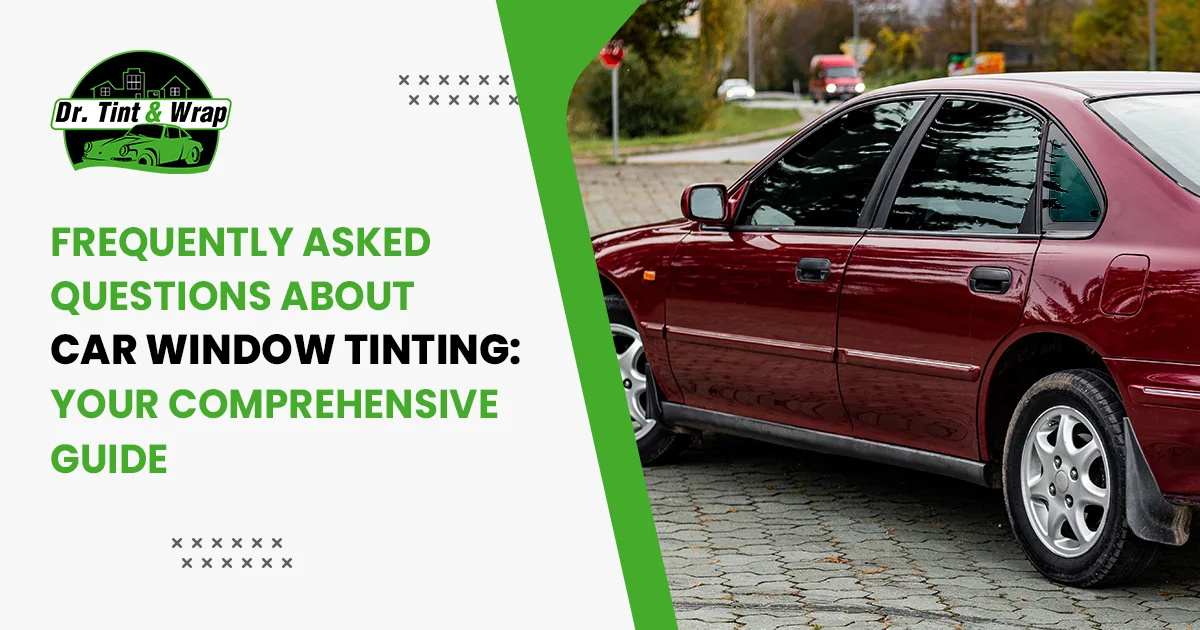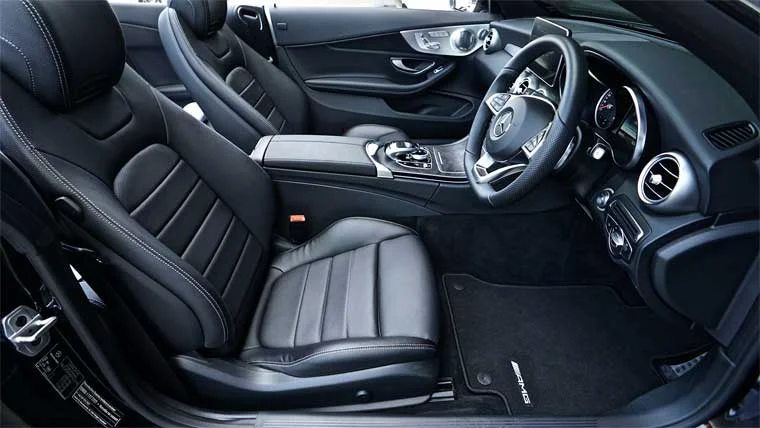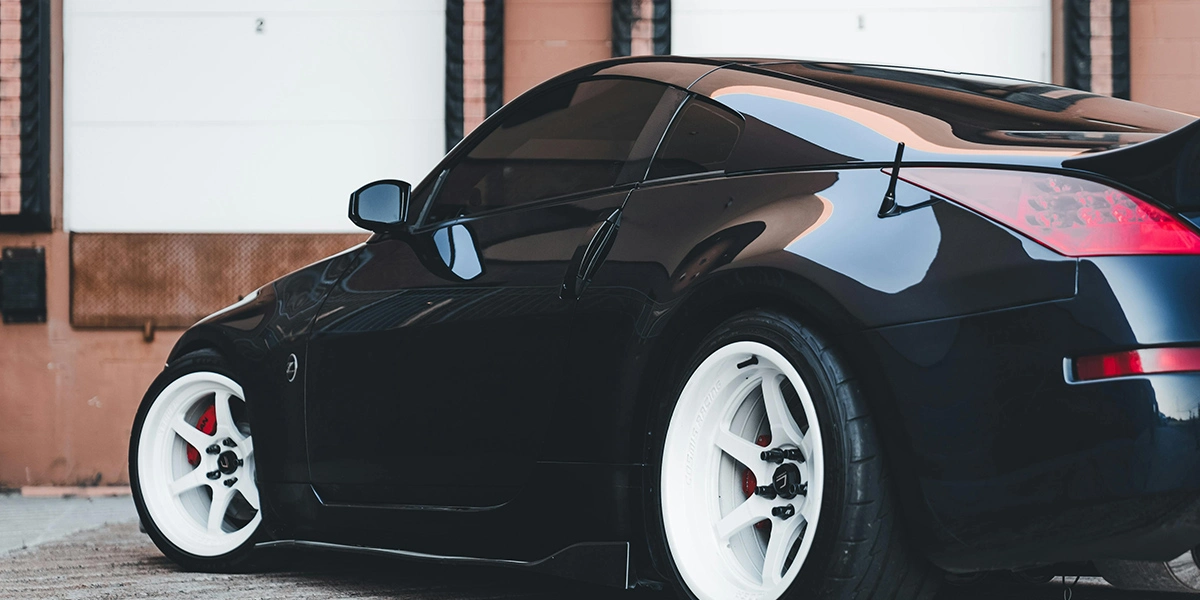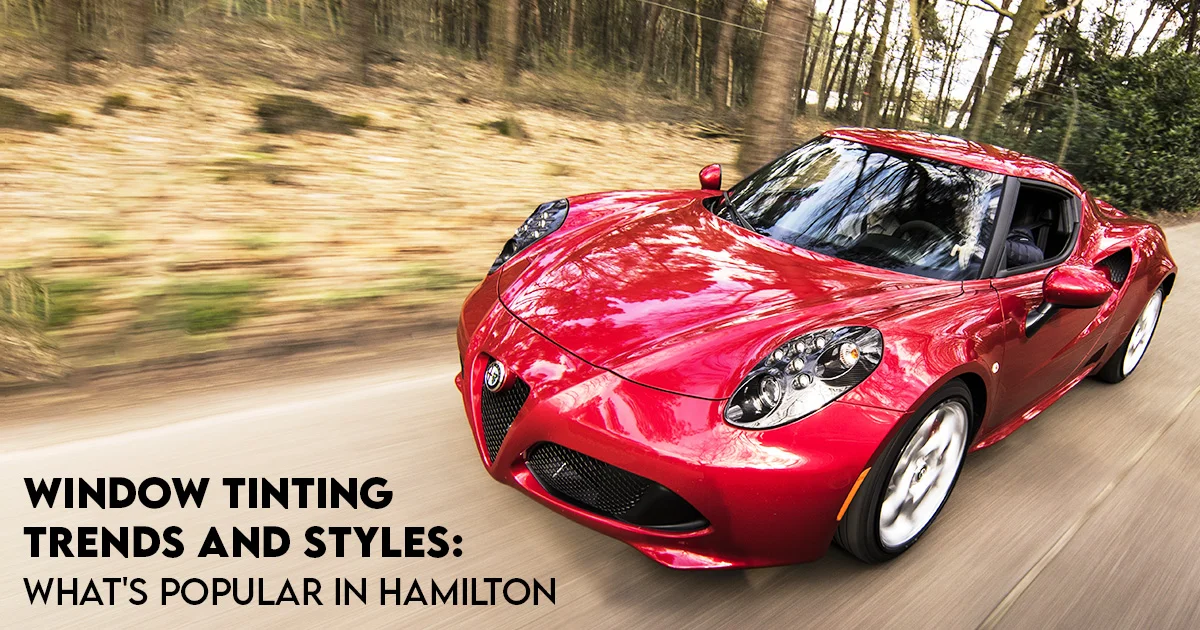
Frequently Asked Questions about Car Window Tinting: Your Comprehensive Guide
11 Oct 2023, By AdminCar window tinting has become increasingly popular for its numerous benefits, from enhancing privacy and aesthetics to protecting against harmful UV rays. However, with its rising popularity, there come several questions. In this blog post, we'll address some of the most common queries people have about car window tinting, providing accurate and informative answers to help you make an informed decision.
1.Why should I tint my car windows?
Car window tinting offers several benefits, including UV protection, heat reduction, glare reduction, enhanced privacy, and safeguarding your vehicle's interior from fading. It also adds to the overall aesthetics of your car.
2. Is car window tinting legal?
Yes, but the legal limits vary by state and country. It’s crucial to check local regulations. Most places have restrictions on how much visible light can pass through the tint. Professional tinting services are typically aware of local laws and ensure your tinting adheres to these regulations.
3. Can window tinting prevent my skin from getting damaged by UV rays?
Yes, quality window tints block a significant amount of UV rays, reducing your exposure and minimizing the risk of skin damage. This protection is especially important for people who spend a lot of time driving.
4. Does window tinting interfere with visibility, especially at night?
When professionally installed, window tints should not interfere with visibility, both during the day and at night. It’s essential to choose an appropriate tint shade and have it installed correctly to ensure clear visibility.
5. How long does the tinting process take?
The time taken to tint your car windows depends on the type of vehicle and the complexity of the job. On average, it takes a professional installer a few hours to complete the process. However, this can vary, so it’s best to check with the service provider.
6. Can I wash my car immediately after tinting?
No, you should wait a few days before washing your car after window tinting. This allows the adhesive to cure completely, ensuring the tint adheres properly to the glass. Follow the specific guidelines provided by the tinting professional for the best results.
7. How long will window tinting last?
The lifespan of window tinting varies based on the quality of the tint and the installation. High-quality tints, when professionally installed, can last between 10 to 15 years. Regular maintenance and cleaning also play a role in prolonging the tint’s life.
8. Can I tint my windows myself with a DIY kit?
While DIY kits are available, professional installation is recommended for the best results. Professional installers have the expertise and tools to ensure the tint is applied evenly and without bubbles or imperfections. DIY tinting can often result in subpar outcomes.
9. Will window tinting interfere with my car's electronics or radio signals?
No, high-quality window tints do not interfere with your car’s electronics or radio signals. Modern window films are designed to be non-conductive and won’t disrupt your vehicle's electrical systems.
10. How do I maintain my tinted windows?
Maintaining tinted windows is relatively easy. Clean them with a mild, non-ammonia-based cleaner and a soft cloth. Avoid using abrasive materials that could scratch the surface. Regular cleaning helps maintain the tint's appearance and longevity. In conclusion, car window tinting is a practical and valuable investment for your vehicle. By understanding the process and benefits, you can make an informed decision and enjoy the many advantages that tinted windows offer. Always opt for professional installation to ensure a high-quality and long-lasting result.

Car Window Tinting: A Boon for Leather Upholstery
11 Oct 2023, By AdminThe privacy and elegance that comes with tinting your car is priceless in the times where every step was taken in life is scrutinized and seen by everyone. So, while driving, it is always good to have your thoughts and your time to yourself, isn’t it? Along with the added benefit of privacy, tinted windows also help in protecting the interiors of the car. The investment that goes into the luxury of leather seats is something that one is acutely aware of. Now the sun is no friend to leather seats and can easily shorten the life of the seats. Discoloring them, causing cracks to appear or have the color fade, making them look worn
out.
One of the ways in which tinting your car’s windows is the protection it will provide to the elegant leather seats. Tinting windows can help control the harsh rays of the sun and also lessen how much the car heats up as well. Along with the rays of the sun, the harmful ultraviolet rays can be controlled with the power of tinting does right. Because of UV exposure, the car’s interiors can tend to get damaged.
With leather seats, the continued UV rays can cause the natural oil in the leather to dry out which causes unsightly stains. Along with UV rays and the rays of the sun, heat can also a lot of damage to leather seats. Without the added benefit of tinted windows, the heat trapped inside cars causes the leather to age faster.
Tinted windows can help keep the car cooler by creating a dark barrier between the sun and the leather seats of the car. Another problem that can worsen the impact of ultraviolet rays is any liquid or food that can fall on the leather seats with combines with these rays and can damage the upholstery of the car.
The right tint on your car windows can make all the difference to the look of your car. By making sure that the tinting has been done exceptionally can lengthen the life of the leather upholstery as well. One should always make sure that the window tinting on the cars should always be done by a professional. If not done properly, it can cause bubbles to appear in the film and also hinder sight while driving.
So, book your tinting consultation with Dr. Tint today!

What is Car Tint and how much does it cost in Auckland
11 Oct 2023, By AdminCar tint is a thin film applied to vehicle windows that helps control the amount of light and heat entering the car's interior. Available in various shades and levels of darkness, car tint offers a range of benefits, including increased privacy, UV protection, and heat reduction. It can reduce glare, shield upholstery and interior surfaces from sun damage, and improve energy efficiency. Additionally, tinted windows can enhance a vehicle's appearance and safety by providing extra shatter resistance in case of an accident. However, it's important to be aware of and comply with local car tinting laws and regulations to avoid fines or penalties.
What Are the Benefits of Car Tint?
Car tinting offers several advantages for vehicle owners in New Zealand. A major benefit is improved privacy, as tinted windows make it harder for others to see inside the vehicle, which is particularly useful for those who keep valuables in their car.
Another advantage is reduced glare. Tinted windows cut down on the amount of sunlight entering the vehicle, minimizing glare and creating a more comfortable driving experience, especially on sunny days or for those with sensitive eyes.
Car tinting also provides enhanced UV protection. By blocking harmful UV rays, car tint helps protect both skin and eyes from sun damage. This is especially important in New Zealand, where high UV levels contribute to elevated skin cancer rates.
Additionally, tinted windows improve comfort by regulating the vehicle's interior temperature. By reducing heat buildup, car tint decreases reliance on air conditioning, which can enhance fuel efficiency.
Finally, car tinting boosts a vehicle's aesthetic appeal. It adds a sleek, sophisticated look to any car, from station wagons to sports cars, with various shades and styles available to match individual preferences and vehicle types.
In summary, car tinting in New Zealand offers enhanced privacy, reduced glare, increased UV protection, improved comfort, and an upgraded appearance, making it a popular choice among vehicle owners.
Cost Factors for Car Tinting in New Zealand
Several factors can affect the cost of car tinting in New Zealand. One of the primary considerations is the size of the vehicle and the number of windows to be tinted. Larger vehicles, such as SUVs or vans, generally require more materials and labor, leading to higher costs. The type and quality of the tinting film also play a significant role in pricing. Standard tints are typically more affordable, while high-performance ceramic films, known for their superior heat and UV-blocking properties, are more expensive. The desired darkness or level of tint can also influence the cost, as darker tints may require additional layers. Additionally, the reputation and expertise of the tinting service provider can impact the price. Choosing a reputable, experienced professional may cost more but ensures high-quality installation without defects or damage. Considering these factors can help car owners make informed decisions and find a balance between their budget and the desired benefits of car tinting.
Types of Car Tint
Car tinting involves applying a thin, transparent film to vehicle windows. In New Zealand, various types of car tint are available to suit different needs and preferences, each offering distinct characteristics and benefits:
- Dyed Films: These are the most common and cost-effective options. They reduce sunlight and glare, enhance interior comfort, and offer some UV protection.
- Metallic Films: These films contain metalized particles that improve heat rejection and glare reduction. They are well-suited for hot climates and sunny conditions.
- Carbon Films: Known for excellent UV protection and heat rejection, carbon films do not interfere with electronic devices and offer good visibility with high light transmittance.
- Ceramic Films: Advanced ceramic films provide the highest level of heat rejection without affecting electronic signals. They offer exceptional UV protection, reduce glare, and maintain excellent visibility.
- Crystalline Films: Crystalline films are the top-of-the-line option. Crystal films provide extreme heat rejection while ensuring maximum visibility and a clear appearance. Although they are more expensive, they deliver the ultimate driving experience.
When choosing the right car tint film for your vehicle, consider factors such as heat rejection, UV protection, visibility, and your personal preferences. Consulting with a professional window tinting service can help you select the best option for your needs.
Size of Vehicle Windows
The cost of car tinting is significantly influenced by the size of your vehicle's windows. Larger windows, such as rear windshields, typically involve higher expenses due to the need for more tinting film and increased labor. The greater surface area requires additional materials and more time to apply the film properly.
Smaller windows, on the other hand, need less film, which can lead to lower costs. The complexity of applying tint to larger windows, which often involves more meticulous work to ensure complete coverage, also contributes to higher costs.
When budgeting for car tinting, consider the size of your vehicle's windows. Larger windows, especially rear windshields, generally result in higher costs due to the increased material and labor required. For an accurate estimate based on your vehicle and window sizes, it's best to consult with a professional tinting service.
Number of Windows to be Tinted
The number of windows to be tinted varies depending on the size and type of the vehicle. Smaller vehicles, like sedans and hatchbacks, typically have a standard set of four windows: the front and rear side windows, and the rear windshield.
Larger vehicles, such as SUVs, vans, and station wagons, often have additional windows, including rear side windows and extra windows found in passenger vans. Tinting all windows enhances privacy and security, especially for larger vehicles, by making it more difficult for potential thieves to see inside and assess the value of items left in the car.
Tinting also provides optimal UV protection and reduces glare, protecting the vehicle’s interior from fading and decreasing the risk of skin damage. Additionally, it improves driving comfort by reducing glare from the sun.
In summary, the number of windows to be tinted depends on the vehicle's size and type. Tinting all windows offers benefits like increased privacy, enhanced security, UV protection, and glare reduction.
Quality of Window Film
The quality of window film is influenced by several factors. One key aspect is whether the film comes with a manufacturer's warranty, which ensures that the film meets certain standards and will perform as expected.
Another important factor is the optical clarity of the film. High-quality films should provide excellent visibility both during the day and at night, whereas poor-quality films may distort the view, potentially affecting driving safety.
It’s also crucial to consider any allowable modifications. Some films may offer options for additional tinted overlays, enhancing privacy and aesthetics. However, it’s important to ensure that any modifications comply with local legal restrictions.
Understanding the legal regulations regarding window tinting is essential, as different regions may have specific laws governing the darkness of tints. Adhering to these regulations helps avoid fines and ensures safe vehicle operation.
In summary, the quality of window film is determined by factors such as the manufacturer's warranty, clarity, and allowable modifications. Choosing high-quality films that offer clear visibility and comply with legal standards ensures a safe and enjoyable driving experience.
Installation Process and Labor Costs
The car tinting installation process involves several steps, and labor costs can vary based on vehicle size and the number of windows. The process starts with thoroughly cleaning the windows to create a smooth surface for the tint.
Next, the tint film is precisely measured and cut to fit each window. Accurate cutting is crucial for a proper fit. The film is then carefully applied to the inside of the windows, with a professional installer ensuring that any wrinkles or air bubbles are removed for a seamless finish.
Labor costs typically reflect the time and expertise required for installation. Larger vehicles with more windows generally require more labor, resulting in higher costs.
For an accurate quote based on your vehicle and window requirements, it's advisable to consult with a reputable car tinting service.
Legal Limitations on Window Tints in New Zealand
In New Zealand, window tinting must adhere to specific legal restrictions to ensure road safety. The New Zealand Transport Agency (NZTA) regulates the darkness of window tints through Visible Light Transmission (VLT) percentages. For front-side windows and windshields, the law requires a minimum of 35% VLT, meaning that at least 35% of visible light must pass through. Rear side windows and rear windshields also have a minimum VLT of 35% or darker, though these percentages are not cumulative. Reflective tints are prohibited.
To avoid fines and ensure compliance with New Zealand’s window tinting laws, vehicle owners should follow these regulations closely. Consulting a professional tinting service can help ensure that your vehicle meets legal requirements.
VLT Requirements for Passenger Vehicles and Vans in NZ
In New Zealand, Visible Light Transmittance (VLT) regulations vary for passenger vehicles and vans:
- Passenger Vehicles: The front windscreen and front side windows must have a VLT of at least 35%, allowing 35% of visible light to pass through. There are no specific VLT requirements for the rear side windows or rear windscreen, so they can be tinted darker if desired.
- Vans: The front windscreen must also meet the 35% VLT requirement. However, all other windows on vans, including the front side, rear side, and rear windscreen, must have a minimum VLT of 20%, allowing less visible light to pass through compared to passenger vehicles.
To ensure compliance with these regulations, glazing markings are often used on window films. These markings indicate the VLT percentage, making it easier for drivers and law enforcement to verify compliance.
Adhering to VLT requirements not only ensures legal compliance but also enhances driving comfort by reducing glare and providing UV protection while maintaining sufficient visibility for the driver.
Considerations for Sun Visors, Rear View Mirrors, and Windshields
Sun visors are designed to block direct sunlight and reduce glare, but tinting them is not recommended. Tinting can impair their function, which is to provide clear and unobstructed visibility.
Rear view mirrors must remain unaffected by window tinting to ensure they provide a clear reflection of the road behind. Tinting the windshield can impact the mirror’s effectiveness and the overall visibility of other vehicles.
In New Zealand, tinting on the front windscreen is restricted to a narrow strip along the top, known as a sun visor band. This strip must be no wider than 10 centimeters and cannot extend below the AS1 line marked on the glass.
Additionally, rear view mirrors and other accessories, such as radio antennas or demister units, should not be obstructed by modifications. Glazing markings on window film help verify that VLT requirements are met, ensuring safety and compliance.
In summary, when tinting car windows, consider the functionality of sun visors, rear view mirrors, and windshields. Adhering to legal requirements for these components, using glazing markings, and choosing a reputable tint installer will ensure compliance with regulations and maintain safe driving conditions.
Types of Car Tinting Products Available in New Zealand
When selecting car tinting products in New Zealand, there are various options to suit different needs and preferences. Each type of tint offers unique benefits, enhancing both comfort and style.
Standard Tints Standard tints are a popular choice for those seeking UV protection and moderate privacy. They provide a balanced level of light transmission, allowing enough visibility while offering some shade from the sun’s glare.
Ceramic Films Ceramic films are renowned for their superior performance. They excel in heat rejection, significantly reducing the amount of heat that enters the vehicle, which helps to keep the interior cooler and can lead to fuel savings by reducing air conditioning use. Additionally, ceramic films offer excellent UV protection, safeguarding both occupants and the vehicle’s interior from harmful sun rays. These films also minimize glare, improving driving comfort and safety. Durable and resistant to fading, bubbling, and peeling, ceramic films are a long-lasting investment for vehicle owners.
Carbon Films Carbon films are favored for their outstanding heat rejection and UV protection. These films come in various shades, allowing you to select the level of tint that best suits your preferences. Carbon films help keep the vehicle’s interior cool and reduce reliance on air conditioning, contributing to fuel efficiency. They maintain good visibility both during the day and at night, making them a practical choice for enhancing driving comfort and safety.
Metal Films Metal films feature tiny metal particles embedded in the film, providing a reflective appearance. They are highly effective in rejecting heat and blocking UV rays, helping to keep the car’s interior cooler and preventing damage to upholstery and occupants’ skin. However, metal films can sometimes create glare and may interfere with electronic devices like GPS or mobile phones.
Popular Brands of Window Tint
In New Zealand, several reputable brands offer high-quality window tinting products. Among the most trusted are STEK, 3M, and Lumar.
- STEK: Known for its innovative and high-performance window films, STEK provides a range of options that cater to various needs, including advanced ceramic films for superior heat rejection and UV protection.
- 3M: A leading name in the tinting industry, 3M offers a diverse selection of window films that combine durability with excellent heat and UV protection. Their products are designed to enhance comfort while maintaining clarity and visibility.
- Lumar: Renowned for its high-quality and reliable window tints, Lumar provides a range of choices that deliver effective heat reduction and UV shielding, helping to preserve the vehicle’s interior and improve driving comfort.
Choosing a quality window tint from these reputable brands ensures superior performance, durability, and compliance with New Zealand’s tinting regulations. Although the initial cost may be higher, investing in a quality tint provides long-term benefits and enhances your driving experience.

Window Tinting Trends and Styles: Whats Popular in Hamilton
11 Oct 2023, By AdminWindow tinting has become increasingly popular among homeowners and car enthusiasts alike in Hamilton. Not only does it enhance privacy and protect against harmful UV rays, but it also adds an aesthetic appeal to any property or vehicle. As window tinting continues to evolve, new trends and styles emerge, offering an array of options for Hamilton residents. In this blog, we'll explore the latest window tinting trends and styles that are currently popular in Hamilton.
Ceramic Window Tinting: Ceramic window tinting has gained significant popularity in Hamilton due to its superior heat rejection properties. This advanced technology utilizes ceramic nanoparticles that effectively block out infrared heat while allowing visible light to pass through. The result is a cooler interior, reduced glare, and improved energy efficiency. With its exceptional performance and sleek appearance, ceramic window tinting has become a top choice for both residential and automotive applications in Hamilton.
Privacy and Security Films: In a bustling city like Hamilton, privacy and security are essential considerations for many homeowners and businesses. Privacy and security films provide an effective solution by obscuring the view from the outside while allowing those inside to maintain a clear view. These films come in various designs and opacities, enabling residents to choose the level of privacy they desire. Additionally, security films offer an added layer of protection against break-ins, as they reinforce the glass and make it more difficult to penetrate.
Decorative Window Films: Decorative window films have become a creative way to add style and personality to windows in both residential and commercial spaces. These films come in a wide range of patterns, textures, and colors, allowing for endless customization options. Whether it's a frosted design for privacy in a bathroom or an elegant etched pattern for a storefront, decorative window films can transform plain glass into a visually stunning feature.
Dual-Reflective Window Tinting: Dual-reflective window tinting is another popular choice in Hamilton, offering a balance between privacy and clarity. These films have a reflective exterior surface that provides excellent daytime privacy, while the interior surface remains less reflective, allowing occupants to maintain visibility. Dual-reflective window tinting also provides heat and UV rejection, making it an ideal option for those seeking a versatile solution.
Color-Shifting Window Tints: For automotive enthusiasts in Hamilton, color-shifting window tints have become a captivating trend. These films feature a unique iridescent effect that changes color depending on the viewing angle and lighting conditions. Color-shifting tints not only enhance the appearance of vehicles but also offer privacy and heat-rejection properties. They provide a distinctive and eye- catching look that sets cars apart from the crowd. Window tinting trends and styles in Hamilton have evolved to meet the diverse needs and preferences of residents. From ceramic window tinting for superior heat rejection to decorative films for added style, there is an option to suit every taste and requirement. Whether you're looking to enhance privacy, improve energy efficiency, or simply add a touch of sophistication to your property or vehicle, window tinting offers a multitude of benefits. Dr. Tint & Wrap is a reputable company specializing in professional Window Tinting services in Hamilton. With their expertise and attention to detail, they offer top-notch solutions that enhance privacy, reduce glare, and protect against harmful UV rays, ensuring customer satisfaction.
